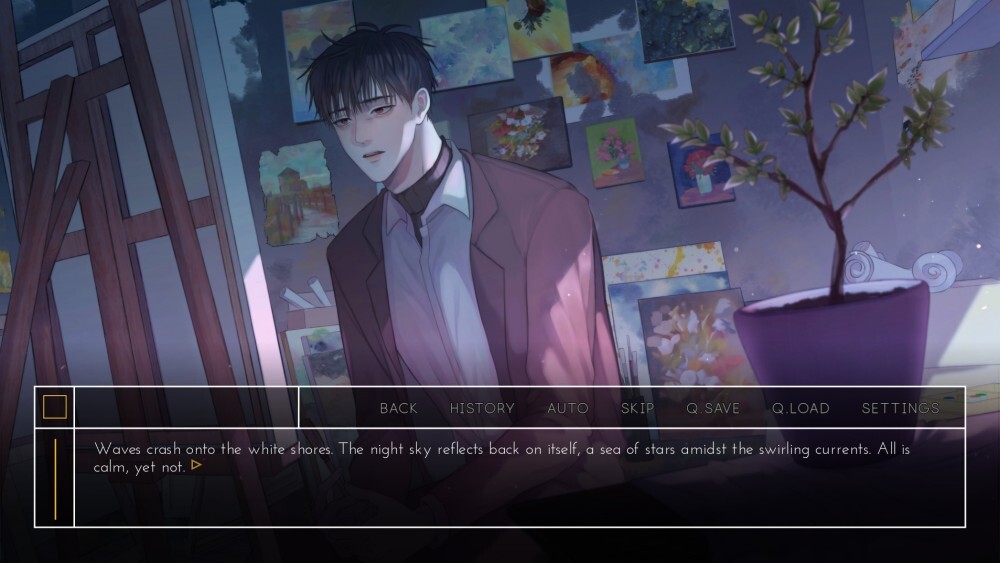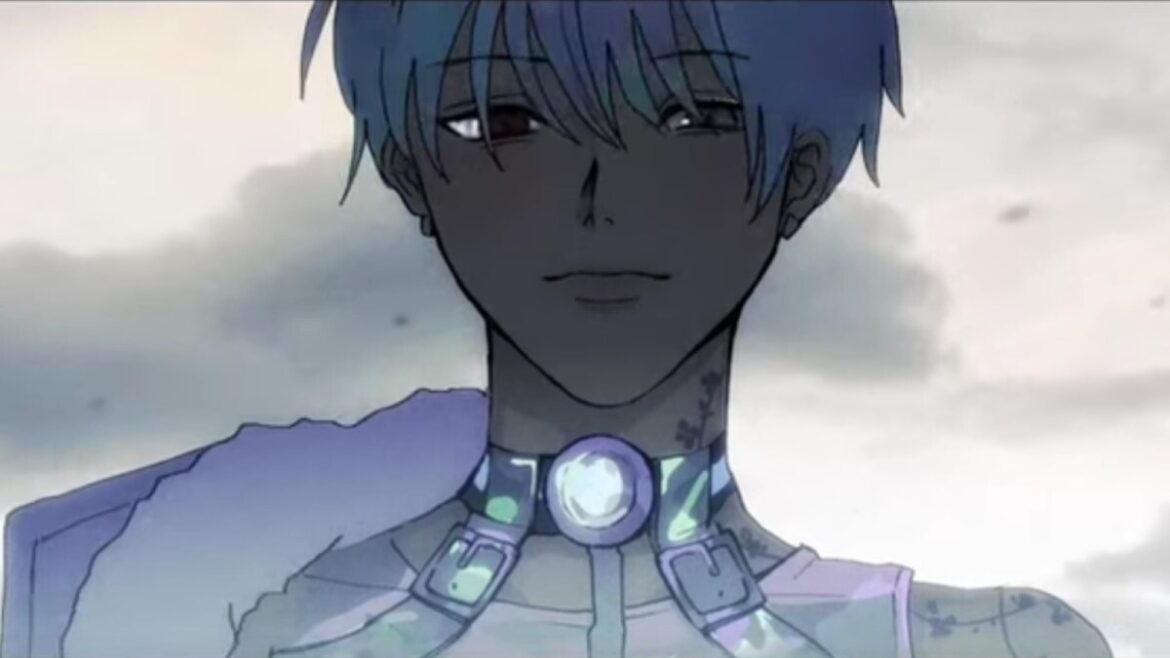Dreambound is the latest gay offering from Two and Half Studios on steam. These prolific queer developers—probably one of the most recognizable on the Steam platform—have produced a number of high drama and well received boy’s love visual novels, including The Divine Speaker, A Date With Death, and Start;Again. If you’ve spent any amount of time looking for gay games, you’ve probably run into their work at some point.
As such they have something of a recognizable style and approach. Pretty boys and death—sometimes the concept made flesh such as in A Date With Death, but more often it is the impact it can have on one’s life, either literal or metaphorical. In that sense, Dreambound fits perfectly in Two and Half’s portfolio.
A Beautiful Setup (That Disappears in a Dream)
In Dreambound, you follow the story of Noah, a man who slips into the dreams of others against his will. These manifest as point-and-click escape room puzzles. The stakes are high: Noah will die if the dreamer wakes up while he is still caught in the dream. It’s genuinely a great concept, one that breaks the tension of the visual novel’s drama into segments. On paper, it should have kept the game fresh and versatile.
There is a way to make a depressed protagonist likeable. Dreambound struggles to do so.
And with a setup like that, it’s great to know it looks great, too. Dreambound is as cozy as it is fragile: rendered in a soft, shoujo like aesthetic married predominately with indie musician Luno’s work filling the soundtrack, it is as breathy as it is haunting. As far as world feel, Dreambound is a smash success.
Unfortunately, Dreambound frequently forgets its own synopsis, and spends far, far too much time in the past. Literally: huge segments of the game are flashbacks, so much so that there’s more time spent in his adolescent trauma than in his present mysteries.
RELATED: “SUDDEN DEATH” is Domino Club’s Brilliant Gay Sports Nightmare
A clumsy start
Dreambound, in its desperate attempt to make a sympatric-but-damaged-by-trauma lead character, does not make a great first impression. In a painful case of telling rather than showing, the narrative drags Noah through a far-too-long exposition of the day a boy named August moved into his school and the ways in which different people, adults and classmates alike, reacted to the new student. It is an impressive miss that the writing manages to both spend such a long time setting up his prologue, and also never hit the character building details that would actually serve its characters best.

And almost all of these issues fall squarely on the shoulders of our protagonist, Noah. The game tells us he’s an artist, but what do we actually see or know about his work? I hate to sound cynical about a queer project, especially one I was excited about, but everything about Noah feels like a checklist of a protagonist as opposed to a person. Not knowing what motivates him to paint beyond “things he likes” is such an incredible cop-out, and one that extends to the depression that makes up the chunk of his dialogue.
There is little nuance to his gothic soliloquies, which would have probably been fine if the game hadn’t taken such great strides to make his grief the focus of an extremely long setup. There are many times where Dreambound, particularly in the prologue, veers close to emotional torture porn. It creates the illusion of addressing suffering, but it always focuses on the suffering itself instead of on solutions.
An Uneven Past…
The juvenile approach to Noah’s feelings towards his talents (and his crush on August) work well enough during flashbacks to his high school days because of course they would, he’s in high school. Is the implication that August’s death robbed Noah of a chance to develop emotionally beyond high school? Perhaps, but the game never seems keen to make that observation itself: it is too busy reveling in the drama of it to move on, itself.
RELATED: Game Studio Deconstructeam Made A Dildo For Its Fans To Fight Over
Note that a queer game about queer love with a high school setting (at least for the flashbacks) almost guarantees the appearance of homophobic parental units. This is less a critique of a game and more of an acknowledgement of the history queer kids share growing up. It’s never easy to sit through when the topic breeches games like this, but I quite like the way Dreambound handled these shadowy figures: by acknowledging them as faceless existential forces that impact the main character, but not giving them the dignity of unearned characterization or justification. It is one of the few things Dreambound‘s prologue nails, even among the clumsy dialogue it uses to get there.
…hides a thrilling future
But once Noah and his best friend Kaine collectively fall into a dream together, the game finally moves. As is frequently with Dreambound, it becomes a far more interesting experience once the puzzles start, but not necessarily because they are puzzles. Rather, it’s because they take place in the present, and deliver on the promise that the strange dreams Noah keeps getting thrown into have an overarching purpose and meaning.
Dreambound handles the supernatural elements of its universe in a far more interesting way than it does its reality. Which is a shame, since it never seems content in staying in the present—or the dreams the game it’s narrative is supposedly centered around—for too long. Even with the introduction of a new character and love interest connected to the dream worlds barges into Noah’s life, petty and somewhat nonsensical interpersonal drama trumps exploration of the game’s most interesting themes, and it’s such a shame when you consider what could’ve been instead.
Overall, had Dreambound been more supernatural-trauma-processing and less high-school-truama-flashbacks, it might’ve stuck with me more. Doubly so if it leaned into the escape room puzzles a bit more. Unfortunately, this game, too, is stuck in it’s own kind of dream: one obsessed with superficial, adolescent drama with pacing that obfuscates the best parts the game, and the story, have to offer.
PROS
- Breathtaking and beautiful art, reminiscent of the effete art of the shoujo BL genre this is inspired by
- Genuinely challenging and engaging escape room puzzles
- Once the “Dreaming” part of the game begins, the story’s mysteries are captivating
- A fantastic and fragile soundtrack perfectly evocative for the game’s dark whimsy
- Kaine is worth chasing (and the game, mercifully, seems to know that)
CONS
- Clumsy and poorly paced novel-to-puzzle ratios in need of trimming/rearranging
- Heavy-handed, overwrought dialogue that gets in the way of a truly great premise
- Noah and Ivan are exhausting clichés, and difficult to like
OVERALL: 58/100
Get real time update about this post category directly on your device, subscribe now.




